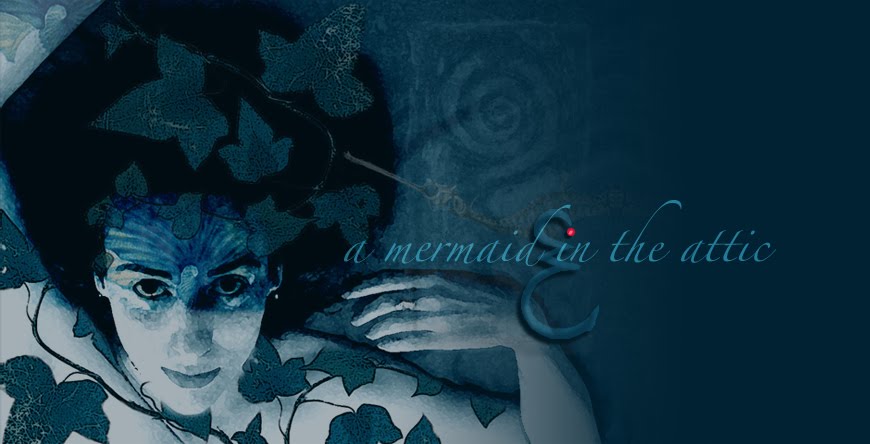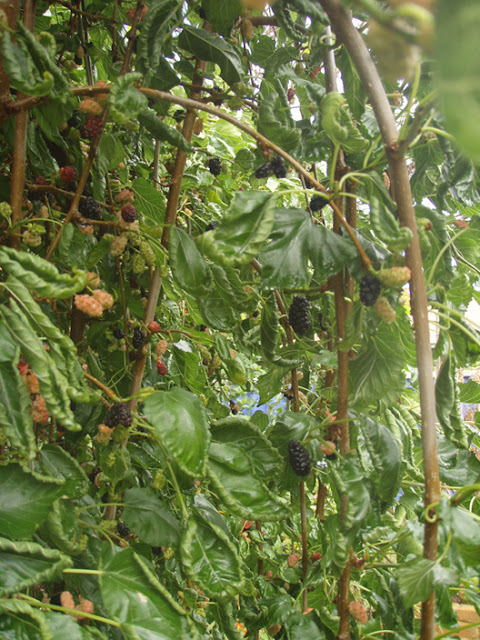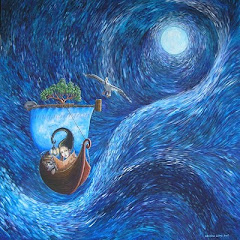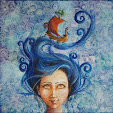Ahhh, a new
moveable feast is arising, starting on Terri Windling's blog with a wonderful post
"On Artistic Inspiration." There she discusses the strange relationship the artist has with the 'muse', with the worlds they are creating (through words or paints or music or whatever), and how sometimes it can seem more than a little like madness. But what is considered madness these days was in the past sometimes considered to be the ability to 'walk between the worlds', to enter the underworld or another spiritual dimension, to contact other beings and most importantly, return bringing all they have learnt back to their people. The path of the shaman.
Most of us who are likely to be reading this will be well aware of the contradictions this presents. We live in the modern age, a rational/logical society that has, mostly, eschewed 'superstition' and the notion of a spirit filled world. Or at least, it likes to think it has, and does not treat those who disagree kindly. The trouble is, as Howard Gayton (Terri's husband) mentions in his
interview with Brian and Wendy Froud, artists "often do live in two worlds," and that second world is frequently not in the slightest bit logical and rational.
As Howard also mentions, "It is a fine line to walk when you are dealing with these principles, treading between what is believable and what is not. When I read about magical principals, a part of me thinks: this is definitely true; and another part thinks: no, this is mad. It's like living in two worlds at once." I find this happens to me often, as if I have two voices in my head (perhaps an argument between the left side of my brain and the right?!), one leans in closer and says "Wow, tell me more," and at the same time, another voice is standing back and scoffing at the silliness of it. Yes, I have Mulder
and Scully inside my brain! I can often be pretty cynical about new age type spirituality. My default reaction to people who claim to channel spirits from Atlantis, or beings from the planet Sirius, is generally "Yeah right, and I suppose you were Cleopatra in a previous life too." The trouble is, as an artist (and interestingly enough, as a singer), I've
had that feeling of someone/thing working through me to create. Something I can't pin down, I can't put my finger on. It's illusive and mutable and inconstant. But I create work, not all the time, but often enough, that seems to come from somewhere else and I almost feel guilty putting my name on it. The fact that sometimes I create artworks that can trigger deep feelings for someone else, that they see things in my art that seem magical and full of strange meaning, doesn't surprise me because I think that's what art is supposed to do. The artist creates something that will resonate far beyond their initial idea/theme/skill, because something in the piece speaks to the personal experiences of another person in a way the artist can never plan for, or understand. But the fact that sometimes my artwork does this to
me in surprising ways, still confounds me. It isn't necessarily big, grand artworks that do this for me. In fact, more often that not it's the smaller, odd little ones. The
Talesingrs do. Both the stories and the artworks, but perhaps the stories most. Maybe I've just somehow convinced my subconscious that what started as a bit of fun (the invention of the 'anthropological' material and my fictitious Professor Woodford-Harding) is all true. But really, it was the other way around. The stories felt to me as if they
had come from somewhere else, they felt
old. They don't feel like mine, so I almost felt they deserved a historical context. It's not an attempt to convince anyone they are 'real', and I hope no-one has thought they were and been disappointed. But at the same time, they
are real. On some level I can't explain.
After a quick search on the web, it is clear there is a great deal of ongoing debate about the link between creativity and mental illness of various kinds. It's an idea with tenacity, it has been around for a very long time, and it seems the jury is still out. Some claim it's just an unhelpful stereotype that can do real damage. Others are adamant it's true. But I remember seeing a documentary a few years ago, and the brains of an artist with no symptoms of mental illness and a person suffering schizophrenia were scanned, and when the artist was in 'creative mode', their brains fired in the same way as the person with the mental illness. The difference, I remember, was that they were not stuck in that mode. They seemed to be able to turn it on and off. In doing my quick skim on the web I found
this article, and in it I found this particular quote, which jumped out at me.
"Specifically, Rothenberg's research concludes that translogical types of thinking characterize both psychotics and highly creatives. Translogical thinking, he explains, is a type of conceptualizing in which the thinking processes transcend the common modes of ordinary logical thinking.
It involves what Rothenberg calls janusian and homospatial processes. Janusian thinking is a conscious process of combining paradoxical or antagonistic objects into a single entity. Homospatial process is the essence of good metaphor. It means to superimpose or bring together multiple, discrete objects."
And here, again, the same idea.
"Two aspects of thinking in particular are pronounced in both creative and hypomanic thought: fluency, rapidity, and flexibility of thought on the one hand, and the ability to combine ideas or categories of thought in order to form new and original connections on the other"
Translogical thinking. It's this idea that struck me, simply because it's news to me that this is unusual. I presumed everyone did this, but maybe they don't? The idea of thinking as a game, where you play with ideas, moving them around and putting odd combinations together just to see what you might get.
So what is happening? Are we all mad? I'm thinking back to
another post I wrote ages ago, about the beauty of the unfinished piece, whether it be painting, poem, story or whatever. That the unfinished piece holds a kind of magic that the finished piece doesn't, a dynamism and vitality because all the possibilities and potentials still exist. And that is the exciting part for me as an artist. Because while that piece stays unfinished, I can hold all those possibilities inside my mind, I can be in all those 'otherworlds' at once. All those contradictions, and impossibilities can co-exist happily. I can move around them, look at them from different points of view, try out different reactions to them. I can thread two together that might seem utterly opposite, and find something beautiful or powerful in that conjunction. And I think this is often the point where that something 'mystical' happens (if we want to put it like that), as if by putting together two disparate ideas we create a pathway that allows something else to come through, something that feels like it doesn't belong to us. A secret whispered in our ears by a muse. Who knows! I once told a uni lecturer that I considered myself a 'post-modern humanist', and was told that was impossible because they are utterly contradictory schools of thought. But it makes sense to me. I can believe in faeries on one hand, and not believe in them at the same time. And both are the truth. I can look at an artwork I have created and see every painstaking line, every problem I had to resolve, remember seeing my hand create this and remember all the thought processes that have gone into it, and see it as nothing more than a thing I have made. And at the same time I can be amazed and awed by what seems to be so much more than the fruits of my labour, a thing magical with a power of its own that is nothing to do with me.
This has probably gone on quite long enough, but it is a subject that I find endlessly fascinating, and enlightening to contemplate. So this may just be 'Part 1.' We'll see. But for now, I'd better get both feet back into the real world, and bring my washing in!
Sometime later....! Author Margo Lanagan's latest post,
'Truly, Madly, Deeply', just popped up in my blog reader. I thought it worthwhile mentioning it here!




























